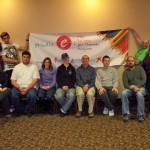
Wilkes-Barre, March 22, 2013- Studio E: The Epilepsy Art Therapy Program is being offered for the
FIRST time for people with epilepsy in the Wyoming Valley Area of North Eastern Pennsylvania. Offered by Epilepsy Foundation affiliates across the country, Studio E empowers people with epilepsy to creatively express feelings related to epilepsy and connect with one another in a safe environment. As a result, the program yields beautiful and meaningful works of art that educate both others with epilepsy and the general public.
“Studio E has made a positive impact in the lives of many people with epilepsy and has provided a new way for them to express their feelings,” said Allison McCartin, Executive Director, EFEPA, “Art therapy
has been shown to help people with epilepsy convey their emotions and experiences with epilepsy
and, as a result, increase confidence and self-awareness. We are so pleased to be able to offer Studio
E to people in the Wyoming Valley area of the EFEPA.”
 The Studio E program will take place at Verve Vertu Art Studio, 47 North Franklin St., Wilkes-Barre, on Mondays from April 8 to May 20 and May 21 from 4:00 pm to 6:00 pm. Each session will be led by Gwen Harleman, Arts Coordinator. To learn more about the local program contact Mary Loughlin, Regional Coordinator for Epilepsy Foundation Eastern PA-NE Resource Center at [email protected] or call 570-592-1150.
The Studio E program will take place at Verve Vertu Art Studio, 47 North Franklin St., Wilkes-Barre, on Mondays from April 8 to May 20 and May 21 from 4:00 pm to 6:00 pm. Each session will be led by Gwen Harleman, Arts Coordinator. To learn more about the local program contact Mary Loughlin, Regional Coordinator for Epilepsy Foundation Eastern PA-NE Resource Center at [email protected] or call 570-592-1150.
Program participants, art therapists, Epilepsy Foundation representatives and others have reported positive outcomes from the 2011 and 2012 programs. These accounts indicate the program has helped people with epilepsy express difficult feelings, become more comfortable engaging with others and build confidence. To better validate these outcomes, plans are underway to use Studio E as a platform to conduct research that may provide us with a more rigorous understanding of the benefits of art therapy.
“The Studio E program cultivates an accepting, non-threatening atmosphere where participants are
empowered to take risks both verbally as well as visually,” said Phil Gattone, president and CEO of the
Epilepsy Foundation. “Honest conversations took place between participants through the course of the
sessions, and by the end of the program, participants were more willing to articulate fears due to having
epilepsy and the impact epilepsy has on their daily lives.”
Studio E is made possible through a partnership between the Epilepsy Foundation and Lundbeck, a
pharmaceutical company committed to people impacted by epilepsy. The program was piloted in 2011
by four cities and expanded to more than 20 cities across the country in 2012. Participants with seizure
disorders of varying severities entered the program led by licensed art therapists.
“At Lundbeck, we understand that living with epilepsy can be challenging and can sometimes feel
isolating,” said Daniel Brennan, vice president of neurology at Lundbeck. “We’re proud to partner with
the Epilepsy Foundation to give Studio E participants the chance to experience the opportunity to
express emotions and connect with others in their community.”
With individual artist’s permission, works of art will be available for viewing at local and national venues
later in the year. These showcases are intended to raise awareness and understanding of epilepsy.
Works of art created as part of the 2012 Studio E pilot program can also be viewed online.
